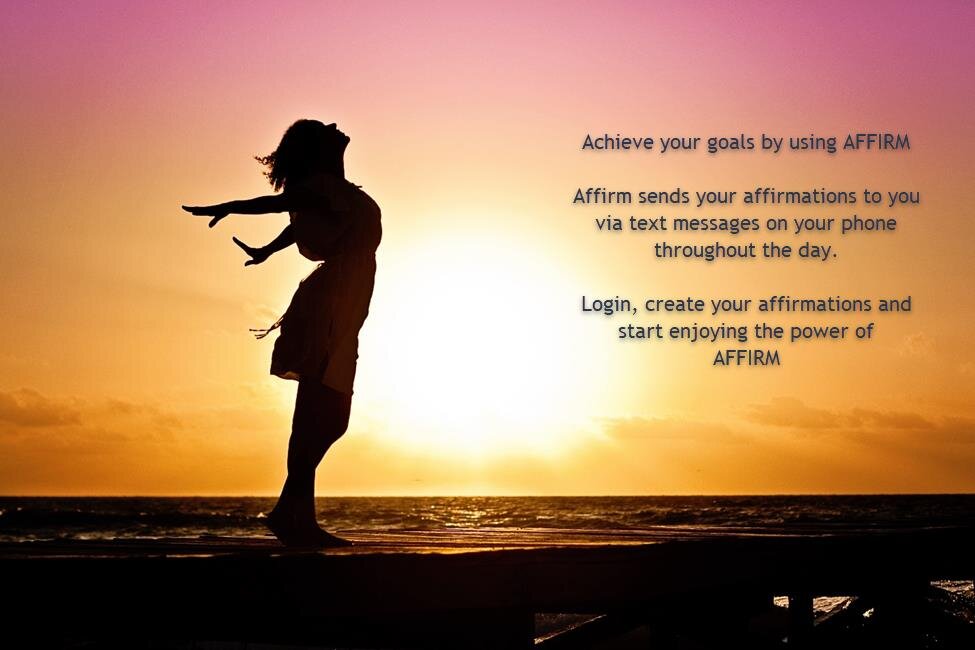As I wrote about in the THE POWER IN AFFIRMATIONS, there are 3 parts to a daily affirmation practice:
1. Read and write them each evening just before bed
2. Read and say them out loud first thing in the morning and
3. Repeat them to yourself throughout the day
Recently I had the opportunity to talk with Mary Schulz, the creator of the AFFIRM Store app, a new tool you can use to help you remember and re-enforce your daily affirmation practice. Today, it is my pleasure to share our conversation with you.
Cinda: Mary, thank you for agreeing to talk to us today about your new app, AFFIRM Store. To begin with, can you tell us how you first learned about affirmations?
Mary: My maternal grandparents were interested in positive thinking and familiarized me with affirmations early on in my life. My grandmother would read from a daily affirmation book that had an affirmation and then a few paragraphs about the theme. I realized that I liked having that positive thought as a theme for the day.
Affirming the positive things in my life and the goals that I wanted to come true, brought me a lot of comfort and success over the years, but I was never consist in using affirmations.
Cinda: How have you used them recently in your life today?
Mary: In 2019, after years of struggling with being overweight, I had come to the decision to buckle down and get my eating under control. I was referred to Cinda Roffman for Hypnotherapy and I was brought back to the power of affirmations.
I used Cinda’s book to write my affirmations each night, as well as a few gratitudes. During my sessions with Cinda, we would review my affirmations to see if I needed any revisions, and she’d state my affirmations while I was under hypnosis. Between appointments was when I could see that I would be working through how to get to these goals…trying new approaches…thinking of things from different perspectives…gaining confidence to do what was needed.
Cinda: When do you use your affirmations?
Mary: I have to confess, I’m not great at reading my affirmations in the morning and saying them out loud. I do have other practices in the morning that help me start my day off on a good footing. But that is also why I love using AFFIRM Store to keep me focused on my goals throughout the day.
Cinda: Do you write your affirmations?
Mary: Yes, every evening while watching TV, I write a few gratitudes and my affirmations. I’ve found that once I’ve headed to bed is not a good time for me to write and have the lights on. So, I’ve compromised and write them while I’m relaxing in the evening.
Cinda: What are some of your affirmations?
Mary: I change up my affirmations as the needs in my life change, but there are some that I have used repeatedly, especially for the harder issues in my life. Here are just a few:
I enjoy and relax in my new appearance
I stick to my eating planT
The food I eat satisfies me.
Cinda: How have you found that hypnosis and affirmations work together for you?
Mary: Some say that you have to believe what you are affirming…but I found that I could affirm things and with the power of hypnosis, introduce into my subconscious mind success that my conscious mind would never have believed. In the process and over time, my conscious mind was able to find ways to start believing in the goals I set and the affirmations I was using, and I made great progress towards my goals.
Repeating my affirmations before going to sleep and multiple times during the day really helped me.
Cinda: Tell us about AFFIRM Store. How does it work?
Mary: With a busy job and life, remembering to think of my goals during the day was hard. So, my software developer husband and I decided to create the AFFIRM Store that randomly sends me my affirmations via text message throughout the day, during the times I designate, to help me stay focused on my goals and reintroduce them to my conscious and subconscious mind. I can have an unlimited number of affirmations in the app, and it will cycle through them.
When I receive my affirmation via text, I love to take a moment and read it out loud, if possible. I find that I gain a sense of calm, similar to the calm I feel under hypnosis, and I can easily move on with the tasks of my day. It’s a great touchstone to center me and the confidence I gain helps me to achieve my goals.
The Standard annual subscription in AFFIRM Store allows up to 5 texts per day and with Premium, up to 12 texts per day. If you have less than 5 affirmations, the app will just cycle through and repeat affirmations until the amount you designate is reached.
I’ve introduced it to a number of my friends, and they love having more than 5 texts per day and just love AFFIRM Store!
Cinda: Any concluding words?
Mary: With the help of affirmations, hypnosis and other programs that I was open to try, I’ve reached my “right-sized” body and have been maintaining it for months.
We invite you to try AFFIRM Store for 14 days for free. Just go to https://www.AFFIRMstore.com to sign up and get started. Then tell us what you think at info@AFFIRMstore.com
Cinda: Thanks again, Mary, for this excellent new tool. If you would like to work together on setting your goals and designing you affirmations for 2021, please contact me.
Sincerely,
Cinda
HypnoNews and Resources
An interesting article about combining mindfulness and hypnotherapy into Mindful Hypnotherapy https://www.news-medical.net/news/20200615/Novel-intervention-for-stress-shows-positive-results-in-pilot-study.aspx
One of my favorite authors, Jack Canfield, writes about the why and how of affirmations https://www.jackcanfield.com/blog/practice-daily-affirmations/



















